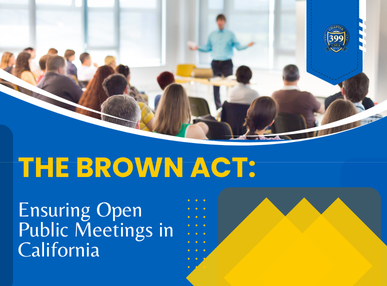The Ralph M. Brown Act is California’s key “sunshine law” designed to make local government decision-making open and accessible. For employees represented by the California School Employees Association (CSEA) working at public school districts, understanding the Brown Act helps ensure your voice and rights are protected in the governing process.
What Is the Brown Act?
Enacted in 1953, the Brown Act guarantees that meetings of local government bodies—including school boards—are open to the public except in very limited circumstances. The law applies to:
- School district boards of education
- District committees and commissions
- Other local legislative bodies
Why Does It Matter to CSEA Employees?
- Transparency: You have the right to know what your school board is discussing, deciding, and planning—especially on topics that impact working conditions, staffing, wages, and district policy.
- Participation: CSEA members can attend, observe, and offer public comment. Your presence can influence board decisions that directly affect your workplace.
- Accountability: When meetings are open, decisions can’t be made “behind closed doors” without public input.
Key Requirements for School Boards
1. Open Meetings
All discussions, deliberations, and actions by the school board must be held publicly unless an exception applies.
2. Notice and Agendas
- Meeting agendas must be posted in a publicly accessible place at least 72 hours before a regular meeting.
- The agenda must list topics to be discussed or acted upon.
3. Public Comment
- CSEA employees and the public must be allowed to comment on any item on the agenda and, within limits, on items not on the agenda.
- Boards can set reasonable time limits for speakers but cannot prohibit comments.
4. Accessible Locations
- Meetings must be held in places that are accessible to all community members, including those with disabilities.
5. Closed Sessions
These are exceptions, permitted only for specific subjects like personnel matters, pending litigation, or labor negotiations. The board must announce (in general terms) the topic before entering a closed session and report any final decisions afterward.
Brown Act and Labor Relations
CSEA employees, as district staff and union members, are often impacted by:
- Contract negotiations
- Staffing decisions
- Changes in district policy or budget
These issues will appear as agenda items and may also involve closed (confidential) sessions. While labor talks may occur confidentially, the broader process, including approval of agreements, must be public.
Common Questions
Can I be required to register my name to attend?
No—everyone has the right to attend anonymously.
Can the board vote in secret on issues like layoffs or salary?
No final actions must be taken in public, and the votes of individual members must be recorded.
What if the Brown Act is violated?
Complaints can be filed, and courts may nullify actions taken unlawfully.
Tips for CSEA Members
- Review published agendas for items affecting your job.
- Attend open board meetings—your presence matters.
- Use the public comment period to share concerns or support.
- Ask your CSEA representative about how the Brown Act applies during contract negotiations and grievance processes.
Conclusion
The Brown Act exists to ensure openness, fairness, and accountability in the way California school districts are governed. By knowing and using your rights under the Brown Act, CSEA employees help protect transparent decision-making in schools, supporting a stronger voice for all district staff.

